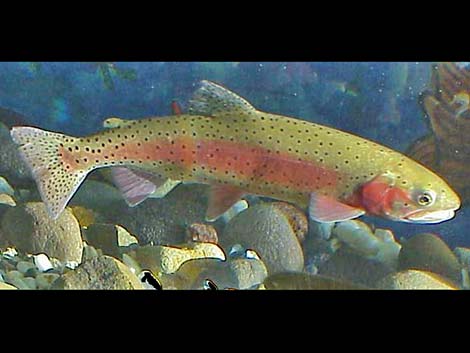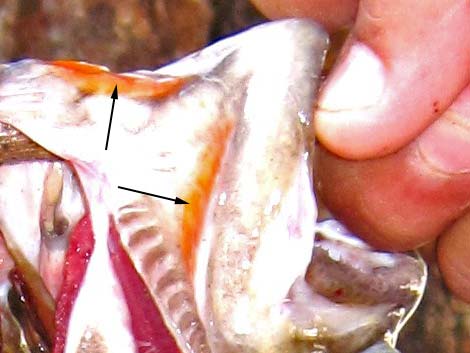
Fish Around Las Vegas, Wildlife Around Las Vegas
 |
General Description: Lahontan Cutthroat Trout (Oncorhynchus clarkii henshawi) are typical trout-shaped, fusiform fish with a dorsal fin set behind the middle of the back and a small adipose fin ahead of the trail fin. Coloration is variable, from green over red to silver, but they are marked with black spots distributed over the sides, head, and abdomen. Spawning fish develop bright red colors under the jaw (the "cut throat") and on the gill cover. Males are more intensely colored than females. In streams, these fish get to about 10-inches long. Taxonomy: Family: Salmonidae. |
 Note the orange "cut-throat" (arrow) under the jaw |
Diet: These predatory fish eat flying insects, aquatic insects, and small fish. Favored Habitat: Occurs in cool flowing water with well-vegetated and stable stream banks and relatively silt free, rocky riffle areas. This species breeds in clear streams. |
 Fair-sized fish! |
Where to Find: Lahontan cutthroat trout are endemic to the Lahontan Basin (northern Nevada, eastern California, and southern Oregon). They naturally occur in cold-water habitats including large alkaline lakes (e.g., Pyramid and Walker lakes), alpine lakes (e.g., Lake Tahoe), slow meandering rivers (e.g., Humboldt River), mountain rivers (e.g., Carson, Truckee, Walker, and Marys Rivers), and headwater streams. Around Las Vegas, look for this species in Carpenter Canyon on the west side of the Spring Mountains National Recreation Area. Normal state fishing regulations apply. |
 Note red on gill cover and black spots on body |
Comments: Lahontan cutthroat trout were introduced to Peak Spring in Carpenter Canyon in the 1950s. Special Remarks: Lahontan cutthroat trout are federally listed as a threatened species. For More Information: See the Western Native Trout Initiative webpage. |
| Fish Around Las Vegas | Wildlife Around Las Vegas | Glossary | Copyright, Conditions, Disclaimer | Home |